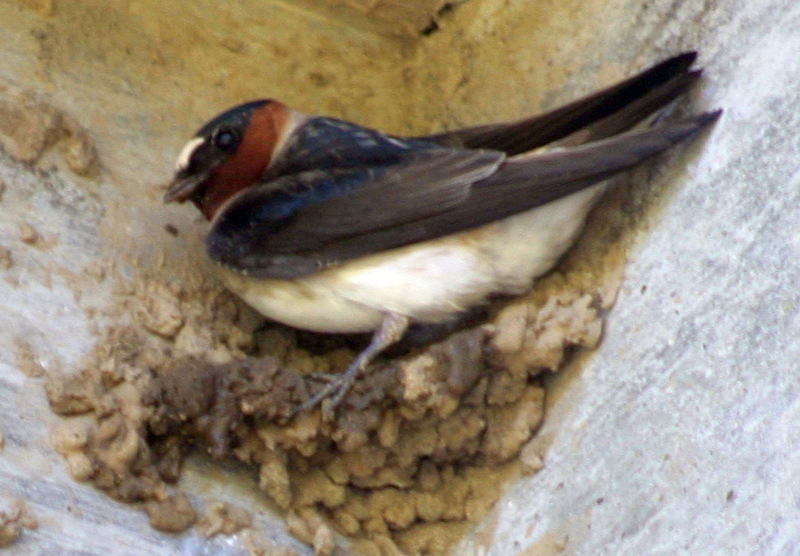|
| 질의: Petrochelidon pyrrhonota | 결과: 2번째/17 | |
Cliff Swallow (Petrochelidon pyrrhonota) - wiki
| 제목: | Cliff Swallow (Petrochelidon pyrrhonota) - wiki
| |

| 해상도: 898x624
파일크기: 178014 Bytes
촬영일: 2007:08:26 20:29:03
등록시간: 2007:08:26 20:31:55
|
Cliff Swallow
From Wikipedia, the free encyclopedia
[Photo] Cliff Swallow nesting under a bridge in Santa Cruz, California. Taken by User:Stephen Turner http://en.wikipedia.org/wiki/User:Stephen_Turner, on May 13, 2006.
The Cliff Swallow (Petrochelidon pyrrhonota) is a member of the passerine bird family Hirundinidae ??? the swallows and martins.
It breeds in North America and Mexico, and is migratory, wintering in southern South America. This species is a very rare vagrant to western Europe.
This bird averages 13 cm (5 inches) long with a tiny bill. The adult has an iridescent blue back and crown, brown wings and tail, and buff rump. The nape and forehead are white. The underparts are white except for a red face. The tail is square-ended.
Young birds are essentially brown above and whitish below, except for the buff rump and dark face.
The only confusion species is the closely related Cave Swallow, which is richer in colour and has a cinnamon rump and forehead.
Cliff Swallows breed in large colonies. They build conical mud nests and lay 3-6 eggs. The natural nest sites are on cliffs, preferably beneath overhangs, but as with the Eurasian House Martin, man-made structures are now the principal locations for breeding. Female Cliff Swallows are known to lay eggs in and move previously laid eggs into the nests of other birds within the colony.
This species has always been plentiful in the west of North America, where there are many natural sites, but the abundance in the east has varied.
European settlement provided many new nest sites on buildings, but the population declined in the late nineteenth and early twentieth centuries as the supply of unpainted barns declined. There has been a subsequent revival as dams and bridges have provided suitable sites. These are the famous swallows that return from Villa Ventana, Argentina every year to the Mission San Juan Capistrano in California on (or around) March 19.
Like all swallows and martins, Cliff Swallows subsist primarily on a diet of insects which are caught in flight.
http://en.wikipedia.org/wiki/Cliff_Swallow
| The text in this page is based on the copyrighted Wikipedia article shown in above URL. It is used under the GNU Free Documentation License. You may redistribute it, verbatim or modified, providing that you comply with the terms of the GFDL. |
|
 |

|

|
Petrochelidon pyrrhonota
2/17 |

|

|
^o^
동물그림창고 똑똑전화 누리집
^o^
|
|